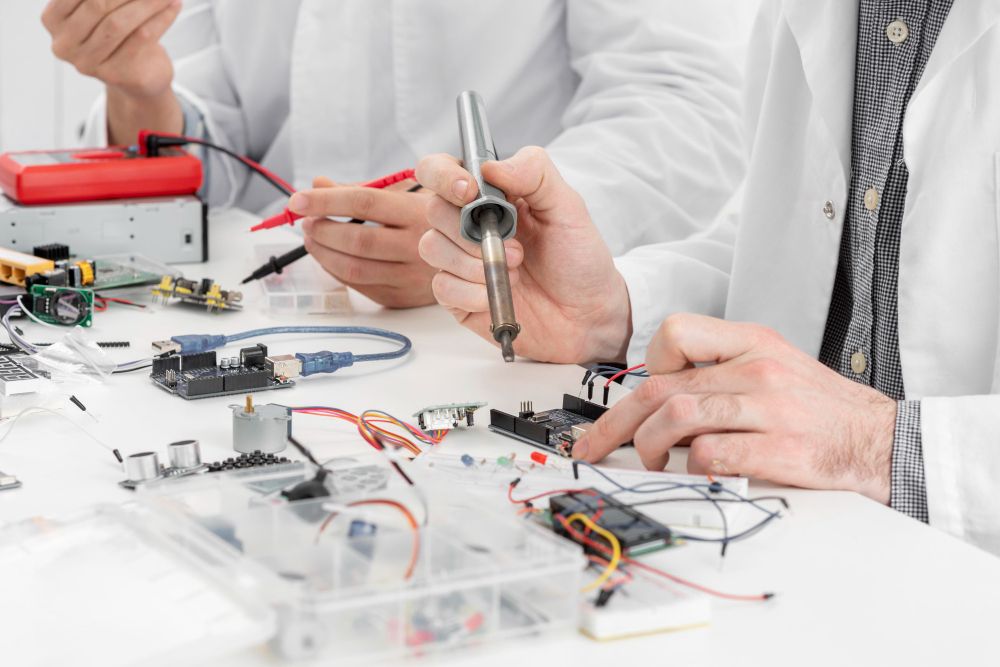- from smartphones and satellites to microchips, medical devices and digital systems. It focuses on how electronic circuits and systems work and how to create new technologies for communication, automation, entertainment, and more.
If you're interested in how things work, love gadgets and tech, and enjoy solving problems with a mix of science, maths and creativity, then Electronic Engineering could be a great degree choice for you.
What Is Electronic Engineering Like at University?
At university, you’ll learn how electronic systems are designed, built, tested and improved. You’ll study the fundamental science and maths behind electronics, gain hands-on experience with components and systems, and learn how to program devices and develop embedded systems.
The course involves a lot of practical work and project-based learning. You'll work with circuit boards, sensors, processors and software tools, and you’ll build systems that respond to the world around them. It’s a degree that mixes problem solving, innovation and technical skill.
What Will You Study?
Most Electronic Engineering degrees include a mix of core engineering principles and specialised electronics topics. Here are some of the key areas:
Circuit Design and Analysis
You’ll learn how to design and understand electronic circuits using resistors, capacitors, diodes, transistors and integrated circuits. This is the foundation for nearly all electronic devices.
Digital Electronics
You’ll explore how digital systems work, including logic gates, microprocessors, digital signal processing and how binary systems handle information.
Embedded Systems and Microcontrollers
You’ll learn to build small, programmable systems that are used in everything from smartwatches to cars. You’ll also gain experience programming hardware in languages like C or Assembly.
Analogue Electronics
While digital systems dominate today, analogue circuits are still essential. You’ll study amplifiers, filters, signal modulation and radio-frequency electronics.
Control Systems and Automation
This covers how systems respond to inputs and how feedback can be used to create stability and precision in machines and electronics.
Communications Systems
You’ll learn how data and signals are transmitted, such as through radio waves, fibre optics or wireless networks — essential knowledge for mobile and internet technologies.
Programming and Simulation Tools
You’ll use software like MATLAB, VHDL or PCB design tools to simulate and model circuits before building them physically.
Project Work
Many degrees include practical design projects throughout the course, especially in the final year. You might work on a prototype, a smart system, or a real-world challenge using electronics.
How Long Does It Take and What Are the Options?
In England, Wales and Northern Ireland, Electronic Engineering is usually a three-year BEng or a four-year MEng integrated master’s. In Scotland, most students take a four-year BEng or five-year MEng. You may also have the option of a year in industry or a year abroad.
Some universities offer joint degrees like Electrical and Electronic Engineering, or Electronic Engineering with Computer Systems, which blend electronics with broader electrical or computing topics.
How Will You Be Taught and Assessed?
You’ll be taught through lectures, lab work, problem-solving classes and group projects. There’s a strong focus on practical work, so expect to spend time in labs and workshops. Assessment is a mix of written exams, technical reports, coursework, coding assignments, presentations and project evaluations.
What A Levels or Subjects Do You Need?
Mathematics – essential for all Electronic Engineering courses
Physics – usually required or strongly recommended
Further Mathematics – useful but not always required
Computer Science or Electronics – helpful, especially for programming and systems design
You’ll need strong skills in problem-solving, numeracy and logical thinking. It’s also helpful to be comfortable working with computers and technology.
What Skills Will You Develop?
Electronic Engineering gives you a valuable combination of technical, analytical and creative skills. These include:
Circuit and systems design
Programming and embedded software
Signal analysis and data handling
Problem-solving and project planning
Practical lab and prototyping skills
Communication and teamwork
Systems thinking and innovation
These skills are in high demand in many industries, especially as technology continues to evolve and expand.
What Can You Do With an Electronic Engineering Degree?
Electronic Engineering graduates are well positioned for careers in a wide range of industries, from technology and defence to energy, transport and healthcare. Common roles include:
Electronics or hardware engineer
Embedded systems developer
Telecommunications or network engineer
Consumer electronics designer
Automotive systems engineer
Medical device developer
Robotics or automation specialist
Signal processing or systems engineer
Software developer or systems analyst
Technical consultant or R&D engineer
Many graduates go on to become chartered engineers, while others pursue postgraduate study in specialised areas like artificial intelligence, nanotechnology, quantum computing or biomedical engineering.
Can You Study Electronic Engineering Abroad?
Yes. In the US, Electronic Engineering is often part of a broader Electrical Engineering programme with optional specialisation. In Canada, degrees are similar and may include co-op work placements. In Europe, countries like Germany, the Netherlands and Sweden offer strong, English-taught engineering degrees. In Australia and New Zealand, Electronic Engineering is usually part of a four-year Bachelor of Engineering with flexible specialisation options.
Is Electronic Engineering the Right Course for You?
If you like building things, enjoy working with technology, and want to understand how the digital world is created and improved, then Electronic Engineering could be an excellent choice. It’s a course for students who want to design the future, whether that’s in computing, communications, automation or smart systems.





